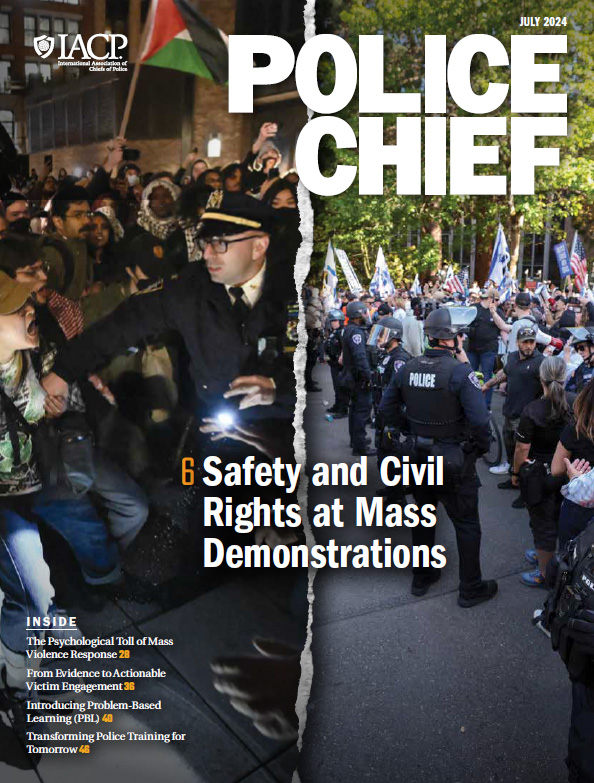Generally speaking, police officers are reluctant help seekers; like many people who work in the helping professions, officers are used to being the helpers—not being in the position of looking to someone else for assistance. One of the most serious consequences of this attitude toward seeking help is the sad fact that, for the last three years, more police officers have died by suicide than were killed in the line of duty.1 Officer wellness programs, which include suicide prevention efforts, are designed to help police officers maintain optimal mental health; these programs are also trying to encourage officers to seek professional help when it is warranted. One of the major barriers to officers seeking help from a mental health professional is the stigma around the concept. Addressing a previously undiscussed aspect of that stigma carries the hope of increasing the likelihood that police officers seek mental health treatment.
The Police Psychologist as an Adversary
Many explanations have been offered to explain why the stigma of seeking mental health treatment has persisted so strongly among police personnel. Some of these ideas include feelings of shame, assumptions of being seen as “crazy” or weak, fear of punitive action by police administration, and fear of being removed from the job. (This list is not exhaustive.) That being said, one previously unexplored explanation for why the stigma of seeking mental health treatment persists is the notion that police personnel view the police psychologist as an adversary.
Typically, at different phases of their careers, police personnel “have to see the psych”—and they view the police psychologist as a barrier to their goals. This perceived adversarial relationship is born at the beginning of almost every officer’s career due to the pre-employment psychological evaluation. Applicants for police officer positions in many departments know that part of getting hired means meeting with and getting a favorable recommendation from a police psychologist; however, they are often unsure of exactly what the psychologist is looking for during the evaluation and may feel uneasy as a result. Moreover, police applicants (who typically have good leadership skills and like to be in control) are likely to feel uncomfortable with being in the one-down position vis-à-vis the police psychologist. For most applicants who are successful in their pursuit of a law enforcement career, this may be their only contact with a police psychologist. This is noteworthy since the pre-employment psychological evaluator has the goal of ensuring that police officers who get hired are psychologically suitable; the police psychologist is helping the agency, not the applicant. This may feel odd to the applicant who is likely to hold the common belief that psychologists help people—and, because the psychologist is not helping the applicant, the perceived adversarial relationship is born.
Once on the job, most police officers do not need to see a police psychologist; in fact, many probably go their entire careers without ever seeing one. However, sometimes things happen in the course of an officer’s career that will lead an officer to see a police psychologist. For example, when officers have been involved in a critical incident (e.g., officer-involved shooting), they will typically meet with a police psychologist for a debriefing session. While the purpose and intent of the debriefing is for the officers’ welfare and mental health, many officers believe that the psychologist is the barrier to their being returned to duty following the incident. Again, here is another situation where officers may see the police psychologist as a gatekeeper of sorts, and feel that they need to “get past” the psychologist to achieve their goal—in this case, to return to duty. Perceiving the psychologist as an adversary also makes the debriefing experience a missed opportunity to shift an officer’s view of the police psychologist to a more favorable direction.
If an officer gets referred for a psychological fitness-for-duty evaluation (FFDE), then that officer is being ordered to meet with a police psychologist. More often than not, the officer will enter the FFDE believing the psychologist is an adversary as the barrier to achieving the officer’s goal—typically, to return to work. This derives, at least in part, from a common trait among law enforcement personnel of being “worst-case scenario” thinkers (or what mental health professionals call “catastrophizing”). In the FFDE context, the worst-case scenario is being found unfit for duty with little chance for recovery and consequently being removed from the position of police officer. A pair of recent large-scale studies of FFDE (830 evaluations covering a five-year period) shows that 94 percent of officers referred for FFDE were returned to duty, either immediately or eventually following a course of mental health treatment.2 Said another way, only 6 percent of officers are not returned to duty; they are found psychologically unfit for duty with little chance for recovery (“unfit and unfixable”). It is important to note that one-third of that 6 percent are officers who are seeking disability retirements. Hence, only 4 percent of officers who undergo FFDEs are seeking to be returned to duty, but are found unfit and unfixable. That being said, anecdotal evidence suggests that most police officers who have been referred for an FFDE believe that they will be found unfit and unfixable. With the unfit and unfixable designation as a possibility, however remote, the FFDE psychologist is easily classified by the subject officer as an adversary.
Across these multiple contexts, the police psychologist can easily be perceived as an adversary by police personnel. As such, it is not surprising that police personnel might be reluctant to engage in individual psychotherapy with a police psychologist, whether the officer is seeking some additional support or in cases where the officer might be experiencing psychological symptoms. When an officer finally does reach out for help, it is typically facilitated by a fellow officer and to a therapist who is known to be familiar with and supportive of the law enforcement community. Some strategies for psychologists, officers, and police leaders are offered herein to help reframe the relationship between police psychologist and police personnel with the ultimate goal of reducing the perceptions of the psychologist as an adversary.
 Strategies for Police Psychologists
Strategies for Police Psychologists
Psychologists who strive to devote their careers to serving members of the law enforcement community must immerse themselves in and be extremely knowledgeable about police culture. This goes far beyond seeking clinical supervision from a more seasoned police psychologist—the police psychologist needs to become a member of the police community and be seen as a trusted ally. This is an ongoing and continuous process, that takes significant time and energy.
In essence, a police psychologist’s training, experiences, and work should all reflect a commitment to serving the police community.
At the same time, there are personal qualities necessary in a police psychologist to earn and maintain the trust from police personnel. For example, given the nature of police work, police psychologists need to be available and accessible to their departments, including outside of normal business hours in cases of urgent need. When an agency reaches out to its police psychologist, it provides an opportunity for that psychologist to either help or harm his or her reputation with the agency. Police psychologists would benefit from being down to earth, approachable, and helpful and by avoiding any reliance on professional jargon. Said another way, the police psychologist who best serves the agency is the one who is, all at once, a friendly, knowledgeable, and trusted expert.
When providing professional services, police psychologists should seek to demystify the work that they are doing. For example, it is helpful for agencies to understand the dimensions of suitability on which candidates are being evaluated during a pre-employment psychological evaluation. Making the process more transparent should also reduce the perception of the psychologist as an adversary—in cases of a negative recommendation regarding an applicant, a transparent process helps all parties see the rationale for the decision. In the FFDE context, the police psychologist should take the time, prior to conducting the evaluation, to explain the possible outcomes of the evaluation to the referring agency. Moreover, the FFDE can also be used as an intervention, when appropriate, in terms of getting an officer into mental health treatment with the goal of restoring the officer to being psychologically fit for full duty.
Strategies for Police Officers
 Many police personnel are focused on maintaining themselves in good, if not optimal, physical health; this includes regular exercise and good eating habits. If an officer becomes overweight, it is likely that officer would not think twice about focusing on diet and exercise to improve his or her physical health. Police personnel need to understand that mental health is just as important as physical health. So, for example, if an officer becomes depressed, bitter, or angry, what does the officer do? Unfortunately, the answer is often nothing. In some cases, officers turn to negative outlets such as mind-altering substances (e.g., alcohol) or extramarital affairs. However, meeting with a psychologist can assist police personnel with mental wellness—officers can think of it like working with a personal trainer for their mental health.
Many police personnel are focused on maintaining themselves in good, if not optimal, physical health; this includes regular exercise and good eating habits. If an officer becomes overweight, it is likely that officer would not think twice about focusing on diet and exercise to improve his or her physical health. Police personnel need to understand that mental health is just as important as physical health. So, for example, if an officer becomes depressed, bitter, or angry, what does the officer do? Unfortunately, the answer is often nothing. In some cases, officers turn to negative outlets such as mind-altering substances (e.g., alcohol) or extramarital affairs. However, meeting with a psychologist can assist police personnel with mental wellness—officers can think of it like working with a personal trainer for their mental health.
Along a similar vein, police personnel are accustomed to being evaluated regularly by their supervisors. In addition to any feedback from command staff, police personnel should conduct their own regular self-evaluations. Specifically, officers should look for and recognize any changes in their own behavior. The results could be benign, but they also could be an early warning sign of a possible mental health condition (e.g., depression, anxiety). Police personnel should pay attention to their actions and behaviors, as well as their attitudes. In addition, officers would be wise to listen to trusted people from their personal lives (e.g., significant others, good friends), especially if there is feedback regarding changes in the officer. In sum, understanding oneself as a person will help that individual be a better police officer.
Perhaps it is easier said than done, but police personnel need to understand that the psychologist is not their enemy. Consider a mandatory arrest situation where an officer has no room to exercise any police discretion. Does the officer consider him- or herself an enemy to the person being arrested? Of course not, the officer is merely doing his or her job. In a similar vein, the police psychologist is not acting with malice or treating the officer like an enemy. Rather, the psychologist is doing his or her job—making a decision based on the data being presented. In addition, in an FFDE context, officers should educate themselves regarding the likely outcomes; as noted above, the data regarding FFDE outcomes do not support the catastrophic thinking that often accompanies officers into the FFDE evaluation. Lastly, if the FFDE psychologist recommends or even mandates a course of mental health treatment, police personnel should remember that this treatment is designed with the goal of improving the officer’s functioning and restoring the officer to a mentally well, full-duty status.
Strategies for Police Leaders
Police leaders need to lead by example. If they expect their officers to seek mental health treatment, then they themselves must be willing to do so. Moreover, leaders should be transparent and honest about it, as this will normalize seeking mental health treatment. This would be a paradigm shift for many departments, but any change to an organization requires legitimate and real buy-in from the leadership of that organization. By making mental health and wellness a regular part of police operations and the culture of the department, police leaders can increase the comfort that members of their agency have with mental health professionals. One way to accomplish this goal is to introduce the police psychologist to department personnel. By including the department psychologist in the regular operations of the agency, opportunities are afforded for trust and rapport to be built between the police personnel and the doctor. When officers need assistance at some point in the future, that previously established rapport should make them feel more comfortable with reaching out to the psychologist.
 That being said, it is important to realize and acknowledge that some police personnel could be unwilling to seek mental health treatment voluntarily (at least initially). Hence, one possible strategy for success is to offer incentives to increase the likelihood of an officer seeking treatment. For example, many departments afford officers the opportunity to go to the gym and exercise on department time—similarly, officers could be given an opportunity to seek mental health treatment on department time. If going on department time is not available, then perhaps officers could earn compensatory time-off (i.e., time in lieu of cash) or some other mechanism to demonstrate support for the officers seeking to better themselves. Again, police leaders can communicate to their officers that mental and physical health are both important.
That being said, it is important to realize and acknowledge that some police personnel could be unwilling to seek mental health treatment voluntarily (at least initially). Hence, one possible strategy for success is to offer incentives to increase the likelihood of an officer seeking treatment. For example, many departments afford officers the opportunity to go to the gym and exercise on department time—similarly, officers could be given an opportunity to seek mental health treatment on department time. If going on department time is not available, then perhaps officers could earn compensatory time-off (i.e., time in lieu of cash) or some other mechanism to demonstrate support for the officers seeking to better themselves. Again, police leaders can communicate to their officers that mental and physical health are both important.
That being said, some officers may be reluctant to engage in mental health treatment despite incentives; hence, another strategy could be to have a mandatory annual wellness check for every uniformed member of the department (i.e., a unified approach to keeping the officer’s mental health at an optimum level). It would be very important for the department to have buy-in from the union before establishing this kind of program.
Embedded in these suggestions is another critical fact—police leaders must communicate that they view an officer seeking mental health treatment, especially proactively, as a positive decision by the officer. It is important for officers to know that seeking treatment will not serve as a detriment to their overall career development (e.g., that it won’t hamper their chances of being promoted). In fact, leaders can communicate a message to their officers that seeking treatment will help the officers function more optimally, which, in turn, should lead to improved job performance and the rewards that accompany good performance (e.g., coveted assignments and promotions).
For some officers, it might not be possible to convince them (at least initially) that the police psychologist is not an adversary. Moreover, these same officers are also unlikely to utilize their agency’s employee assistance program. This is because officers are generally more concerned with confidentiality (i.e., that someone will find out they asked for help) than they are about getting better, and because officers also assume that they will feel more comfortable talking to a trusted peer than a mental health professional. As such, departments would benefit from establishing a peer support team (PST). In addition to being a source of support for their fellow officers, PST members can help officers see the value in seeing a police psychologist; facilitate getting officers into treatment; and, ultimately, reduce the perception of the psychologist as an adversary.
Similarly, if the department has a chaplaincy program, then the police chaplain may serve as another contact for officer support and as someone who can facilitate officers getting into mental health treatment. Although police chaplains may perform a variety of functions within a department, one underlying purpose of a chaplaincy program can be to develop trust between officers and chaplains so that the officers have an additional resource, whom they trust, to turn to in times of need. This is not to suggest that chaplains replace mental health professionals; rather, officers who feel more comfortable talking with their chaplain might be inclined to start there when they are in need. Providing some brief mental health training to police chaplains is important, so that the chaplain knows when a referral to a mental health professional is warranted.
IACP Resourcesn Fitness for Duty Evaluation Guidelines n Consulting Police Psychologist Guidelines |
There are times where police leaders will need to refer an officer for an FFDE. When this happens, it is very important that the police leader have a thorough understanding of when and how to utilize an FFDE. As noted in the FFDE guidelines published by IACP, police leaders should consult with their psychologist prior to referring an officer for an FFDE. It is critically important that police leaders do not “weaponize” the FFDE as a tactic for trying to get rid of an officer. In addition, information gleaned from the police psychologist during an FFDE should not be used to ostracize or stigmatize an officer. Moreover, the officer referred for an FFDE may be reluctant to be candid with the psychologist due to privacy concerns. Hence, police leaders need to ensure that information and results from an officer’s FFDE are limited to only those persons who need to know. Police leaders need to understand that the goal of an FFDE is to return a healthier and better functioning officer back to the department. As noted above, the overwhelming majority of officers referred for FFDE are returned to duty, either immediately or eventually, and police leaders should not forget how much time, energy, and financial resources have been devoted to the development and training of their officers. In sum, police leaders can reduce the perception of the psychologist as an adversary by following these suggestions.
Conclusion
Reducing the stigma of police personnel seeking mental health treatment can help lower the rate of police officer suicides, reduce the number of officers who prematurely retire, and facilitate police officers’ retiring in good mental health. Police leaders and police psychologists should work together to help ensure the mental wellness of all police personnel. 🛡
Notes:
1 Blue H.E.L.P., “159 American Police Officers Died by Suicide in 2018,” December 31, 2018.
2 Lewis Z. Schlosser and Matthew E. Guller, “Unfit and Unfixable: A Closer Look at Officers Found Unfit for Duty with Little Chance of Recovery,” The New Jersey Police Chief (March 2016): 11–13.
3 IACP Police Psychological Services Section, “Psychological Fitness-for-Duty Evaluation Guidelines,” 2013.
Please cite as
Lewis Z. Schlosser and Chief Andrew A. Kudrick Jr., “ ‘You Have to See the Psych’—Reducing the Stigma of Seeking Mental Health Treatment among Police Personnel” Police Chief 86, no. 5 (May 2019): 50–56.



